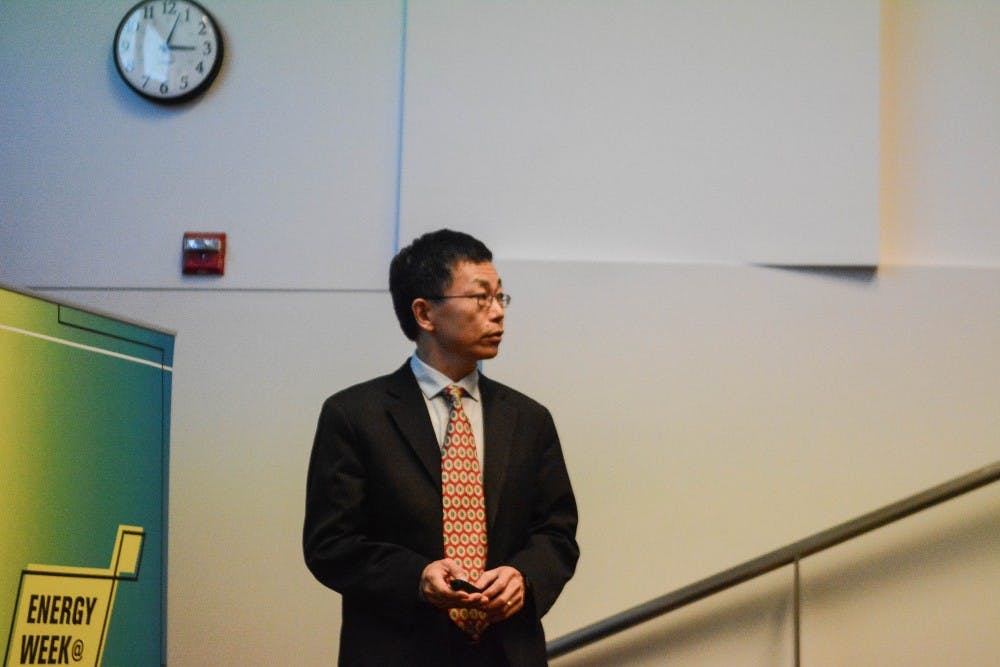Penn hosted its first-ever Energy Week from Oct. 21 to 25 to highlight the breadth and depth of energy innovation at Penn.
Led by the Kleinman Center for Energy Policy and the Vagelos Institute for Energy Science and Technology, Energy Week was Penn's first formal collaboration designed to unite energy researchers across six schools at the undergraduate, graduate, and faculty levels. The week featured a formal launch event, seminars on engineering and economics, the Carnot Prize, and the Wharton Energy Conference.
City and Regional Planning professor Mark Alan Hughes, faculty director for the Kleinman Center and one of the organizers of Energy Week, said the event had three goals: to increase awareness of the breadth and impact of energy research, to demonstrate the multidisciplinary nature of energy research, and to open avenues for potential collaboration. It was the first formal collaboration between the Kleinman Center, which focuses on energy policy, and the Vagelos Institute, which focuses on scientific research in energy.
"We’d like to demonstrate for students and faculty who reasonably don’t fully appreciate how much is going on at Penn and how much of that volume of activity is distributed across a number of different schools and disciplines," Hughes said.
The largest events were the Carnot Prize, which is the Kleinman Center's annual award to individuals who have made a significant impact on energy policy, and the Wharton Energy Conference, which features programs on clean energy transitions and energy investment to unite Wharton students, faculty, and alumni in the energy space. Hughes said the planning process involved scheduling these large events into a single week and then adding additional smaller ones.
“It was first a matter of starting with things that we knew about, and trying to handle the logistics of getting them to all happen in a single week," Hughes said. "But after that, it was a lot more serendipity, and things that we didn’t know about starting coming in."

This week was Penn's first-ever Energy Week to highlight the breadth and depth of energy innovation at Penn.
Energy Week began Monday, Oct. 21 with a presentation of student and faculty research in disciplines ranging from chemistry to mechanical engineering to business, as well as a car built by Penn Electric Racing. College and Engineering senior Zachary Whitlock, who is part of the Vagelos Integrated Program in Energy Research, attended the launch to present his work as an undergraduate fellow in the Research and Education in Active Coatings Technologies program. He stressed the importance of looking at the social side of environmental issues while doing scientific research.
RELATED:
Penn professor's research finds ways to make fuel cell energy storage more effective
Penn's Energy Policy Center receives a $30 million anonymous donation
“Students need to be considering social factors as well as a technical education," Whitlock said. "Engineering and tech doesn’t exist in a vacuum, it exists in a greater and difficult social context, and climate change is just one example."
On Oct. 24, Provost Wendell Pritchett presented the Carnot Prize to Cheryl LaFleur, who served as a commissioner on the Federal Energy Regulatory Commission from 2010 to 2019. In an interview, LaFleur commented on the need for academic spaces like Penn to facilitate the dialogue between energy and policy researchers.
“Universities have an important role in educating future leaders, who are the ones who are going to solve most of today’s problems, but also have a role as a convener and publisher of ideas, because of their perceived neutrality and their level of credibility,” she said. “They aren’t an advocacy association, and they aren’t affiliated with a particular industry or technology. They are an institution dedicated to learning. They are both a convener, educator, and researcher.”
The week also featured several presentations from researchers at Penn. Penny Liao, a postdoctoral researcher at the Wharton Risk Center, shared her work on sea level rise at the Energy Economics and Finance seminar on Oct. 23. Liao said her research looks at the social costs and efficiency loss associated with federal subsidization of flood insurance, bringing together environmental studies, public policy, and economics.
"It’s a necessity to take an interdisciplinary approach to these environmental and energy issues," Liao said. "If we want to study the economic and financial consequences and the evolution of a natural system, it’s necessary to understand the natural processes and to understand the engineering aspects of these things."









